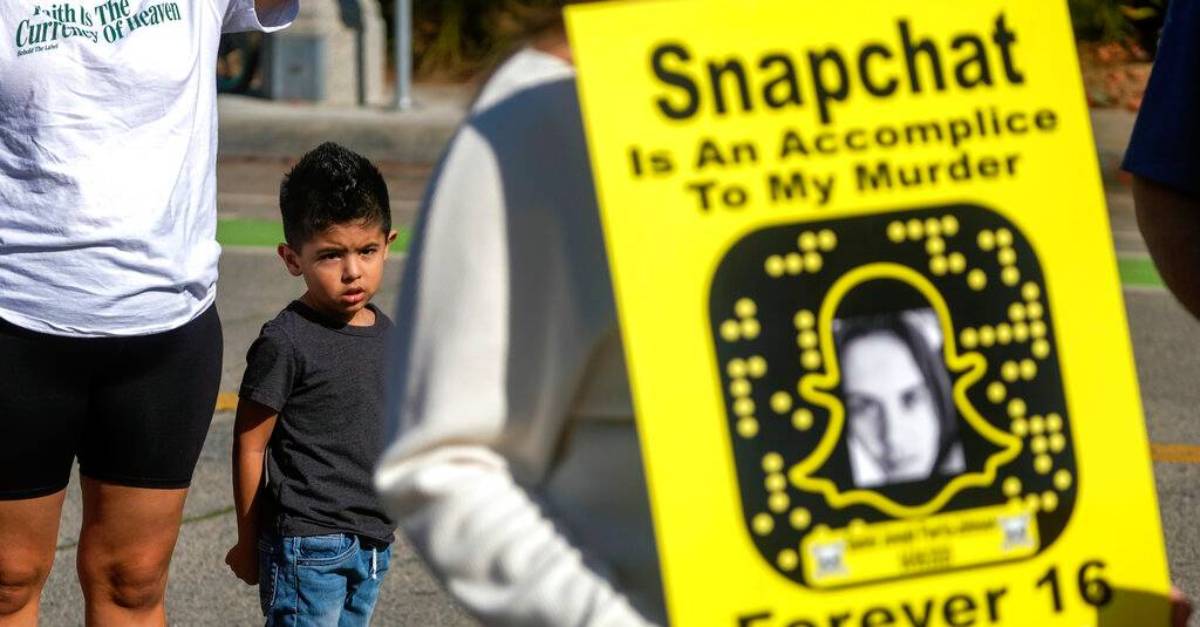
Jonathan Alvarez, 4, looks on as people against the sale of illicit drugs on Snapchat take part in a rally outside its headquarters to demand stricter restrictions on the popular social media app following fatal overdoses from the powerful opioid fentanyl in Santa Monica, Calif. Jan.21, 2022. (Ringo Chiu via AP)
Families whose children died from fentanyl overdoses have filed a class-action lawsuit against Snapchat, alleging the social media platform is a widely used conduit for drug dealers to promote the sale of fentanyl-laced drugs to kids and young adults.
The lawsuit, filed by the families of nine children, alleges the app’s features make it difficult for parents to police the content their children are viewing and is simple for drug dealers to find young people online. The lawsuit also alleges that Snapchat creates a feeling of dependency in still-developing brains, facilitates the illegal and deadly sale of counterfeit pills, provides drug dealers with a steady source of vulnerable customers, and obstructs parents’ ability to supervise their children’s online interactions.
“They all lost a child to fentanyl poisoning from counterfeit drugs obtained through Snap – not through Instagram, not through Tiktok – but through Snap. This isn’t a social media problem. This is a Snapchat problem.” attorney Matt Bergman said in an interview on ABC News.
The lawsuit, filed last month in Los Angeles Superior Court, alleges negligence, unjust enrichment, invasion of privacy and public nuisance, and aiding and abetting. Families in the lawsuit allege that Snapchat was involved in over 75% of fentanyl poisoning deaths involving children between the ages of 13 to 18 and involving a dealer who was connected with the child via social media from 2020 to 2022.
“For context, this means that Snap was responsible for more of these needless deaths – thousands of American children – than all other social media products combined,” the complaint said.
Snapchat said in a statement it is doing its part to combat the fentanyl epidemic.
“The trafficking of fake prescription pills containing fentanyl is an urgent national crisis,” a spokesman said in a statement. “It is devastating that these counterfeit drugs have taken the lives of so many people, and our hearts go out to families who have suffered unimaginable losses. We are committed to bringing every resource to bear to help fight this national crisis, both on Snapchat and across the tech industry overall.”
While the company said it couldn’t comment on active litigation, the spokesman said the social media company is using cutting-edge technology to find and shut down drug dealers’ accounts. They block search results for drug-related terms, redirecting Snapchatters to resources from experts about the dangers of fentanyl. And the company is expanding support for law enforcement investigations, helping them bring dealers to justice.
The company is working closely with experts to share patterns of dealers’ activities across platforms to more quickly identify and stop the illegal behavior, the statement said.
“We will continue to do everything we can to tackle this epidemic, including by working with other tech companies, public health agencies, law enforcement, families and nonprofits,” the company said.
The lawsuit said drug dealers have instant access to thousands of young people in their communities through the use of Snap Map, which pinpoints a user’s geographical location. As a result, drugs have become increasingly easy for kids to access, buy, and have delivered to their front doors, the lawsuit said.
In nearly all Snapchat fentanyl deaths, the victim believed they were buying Oxycontin, Percocet, Xanax, or some other prescription drug from a dealer they connected with through the app, the complaint alleges. The fake pills they received contained lethal doses of fentanyl, readily available online since it’s cheap and easy to manufacture.
In a recent letter to the U.S. Justice Department, the National Crime Prevention Council singled out Snapchat as a product “of particular concern” when it comes to selling fentanyl to young Americans, the complaint said.
This case is about nine children who believed that Snapchat was a safe and silly social media product for kids, so they opened a Snapchat account, the complaint said.
“Instead of providing a safe and silly product and services, however, Snap’s design and programming decisions created harmful dependencies on its product, identified and targeted these children with drug-themed content and drug menus, and affirmatively connected them (and incentivized them to accept such connections) to several Snapchat Drug Dealers,” the complaint said.
The lawsuit alleges that “Snapchat is a ‘digital open-air drug market’ that allows dealers to advertise and distribute fake pills to tweens and teens who are unsuspecting” and may be lured into obtaining dangerous and deadly drugs. The complaint notes that Snapchat’s disappearing messages feature draws in minors interested in evading parental oversight and drug dealers interested in engaging with vulnerable children without detection.
In 2021, the Maricopa County Attorney’s Office in Arizona addressed the Snapchat-fentanyl connection.
“Snapchat is the platform that gets used the most as it provides anonymity, disappearing content, and doesn’t allow third-party monitoring,” the agency said. “For example, drug dealers can post anonymous stories with their ‘menu’ and receive ‘orders’ directly on the app, all of which will disappear, making it hard to track.”
According to the Social Media Victims Law Center, which is representing the plaintiffs in the lawsuit, here are some steps you can take to help protect your children:
- Don’t allow younger children access to Snapchat at all;
- When you do allow your teenager to use Snapchat, require them to give you their Snapchat password and periodically check for signs of inappropriate content;
- Have an honest discussion with your child about following the safety rules of using Snapchat and the potential consequences of not doing so.
Have a tip we should know? [email protected]

